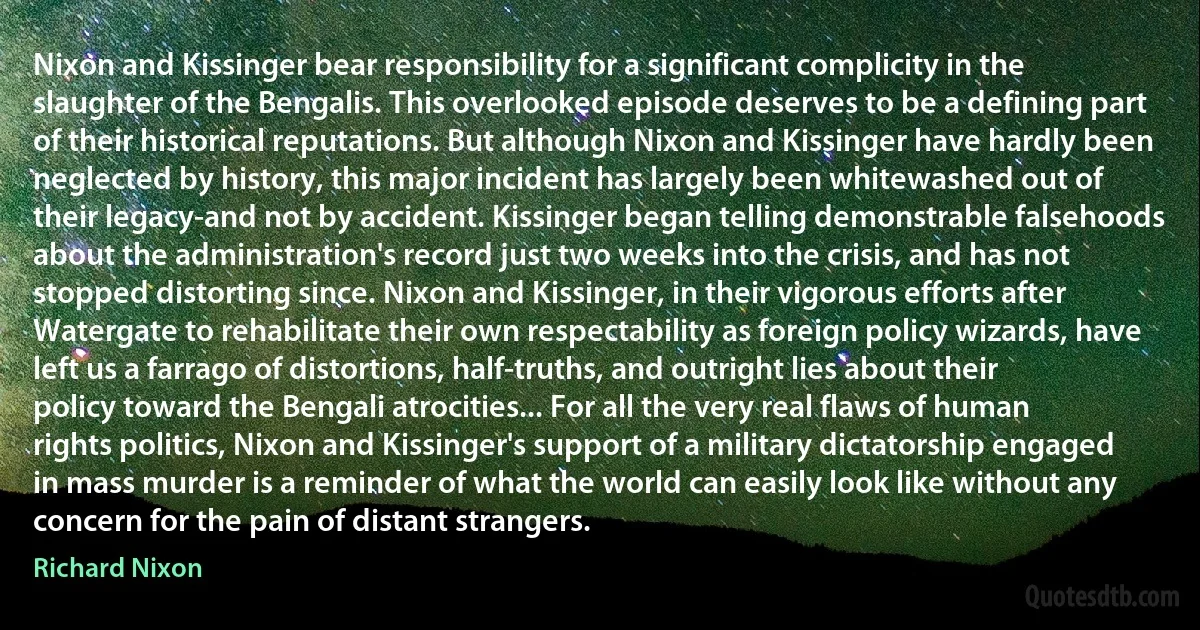
Nixon and Kissinger bear responsibility for a significant complicity in the slaughter of the Bengalis. This overlooked episode deserves to be a defining part of their historical reputations. But although Nixon and Kissinger have hardly been neglected by history, this major incident has largely been whitewashed out of their legacy-and not by accident. Kissinger began telling demonstrable falsehoods about the administration's record just two weeks into the crisis, and has not stopped distorting since. Nixon and Kissinger, in their vigorous efforts after Watergate to rehabilitate their own respectability as foreign policy wizards, have left us a farrago of distortions, half-truths, and outright lies about their policy toward the Bengali atrocities... For all the very real flaws of human rights politics, Nixon and Kissinger's support of a military dictatorship engaged in mass murder is a reminder of what the world can easily look like without any concern for the pain of distant strangers.
Richard NixonRelated topics
accident bear begin bengali defining demonstrable episode foreign historical history human left mass pain politics real reminder respectability significant slaughter stop support telling world Kissinger Nixon lies watergateRelated quotes
At the beginning of the 1980s the world community faces much greater dangers than at any time since the Second World War. It is clear that the world economy is now functioning so badly that it damages both the immediate and longer-run interests of all nations...The problems of poverty and hunger are becoming more serious; there are already 800 million absolute poor and their numbers are rising; shortages of grain and other foods are increasing the prospect of hunger and starvation...Between 20 and 25 million children below the age of five die every year in developing countries...A number of poor countries are threatened with the irreversible destruction of their ecological systems while many more face growing food deficits and possibly mass starvation. In the international economy there is the possibility of... a collapse of credit with defaults by major debtors, or bank failures... [and] an intensified struggle for influence or control over resources leading to military conflicts.

Willy Brandt
The most important victory, in fact, was in Indonesia. In 1965 there was a military coup, which instantly carried out a Rwanda-style slaughter, and it's not an exaggeration. Rwanda-style slaughter, which wiped out the only mass-based political organization, killed mostly landless peasants, and instituted a brutal and murderous regime. There was total euphoria in the United States. So happy, they couldn't contain it. When you read the press, it was just ecstatic. It's kind of suppressed now because it doesn't look pretty in retrospect, but it was understood. Years later, McGeorge Bundy, who was the national security advisor, recognized that, he said, and I think he's right, the U. S. should have stopped the war in Vietnam in 1965, because we basically won. By 1965 South Vietnam was largely destroyed, most of the rest was going to quickly be destroyed, and we had saved the major prize, Indonesia. The rot wasn't going to spread to Indonesia after this delightful Rwanda-style slaughter.

Noam Chomsky
As is often the case with major disputes in economics, the argument over fiscal policy went on for years, with some critics of fiscal policy still defending their position when this book went to press. It seems fair, however, to say that among economists a more or less Keynesian view of the effects of fiscal policy came to prevail. Careful statistical studies at the International Monetary Fund and else where showed that austerity policies have historically been followed by contraction, not expansion. Recent experience, in which countries like Spain and Greece that were forced into severe austerity also experienced severe slumps, seemed to confirm that observation. Furthermore, it was clear that those who had predicted a sharp rise in U. S. interest rates due to budget deficits, leading to conventional crowding out, had been wrong: U. S. long-term interest rates remained near record lows even during the years from 2009 to 2012, when the government ran very large deficits.

Paul Krugman
Hayek sees that the zero-sum vision is fired by an implacable negative energy. It is not the concrete vision of some real alternative that animates the socialist critic of the capitalist order. It is hostility toward the actual, and in particular toward those who enjoy advantages within it. Hence the belief in equality remains vague and undefined, except negatively. For it is essentially a weapon against the existing order – a way of undermining its claims to legitimacy, by discovering a victim for every form of success. The striving for equality is, in other words, based in ressentiment in Nietzsche's sense, the state of mind that Max Scheler identified as the principal motive behind the socialist orthodoxy of his day. It is one of the major problems of modern politics, which no classical liberal could possibly solve, how to govern a society in which resentment has acquired the kind of privileged social, intellectual, and political position that we witness today.

Roger Scruton
I would summarize the Keynesian view in terms of four points:1. Economies sometimes produce much less than they could, and employ many fewer workers than they should, because there just isn't enough spending. Such episodes can happen for a variety of reasons; the question is how to respond.
2. There are normally forces that tend to push the economy back toward full employment. But they work slowly; a hands-off policy toward depressed economies means accepting a long, unnecessary period of pain.
3. It is often possible to drastically shorten this period of pain and greatly reduce the human and financial losses by "printing money”, using the central bank's power of currency creation to push interest rates down.
4. Sometimes, however, monetary policy loses its effectiveness, especially when rates are close to zero. In that case temporary deficit spending can provide a useful boost. And conversely, fiscal austerity in a depressed economy imposes large economic losses.

Paul Krugman
